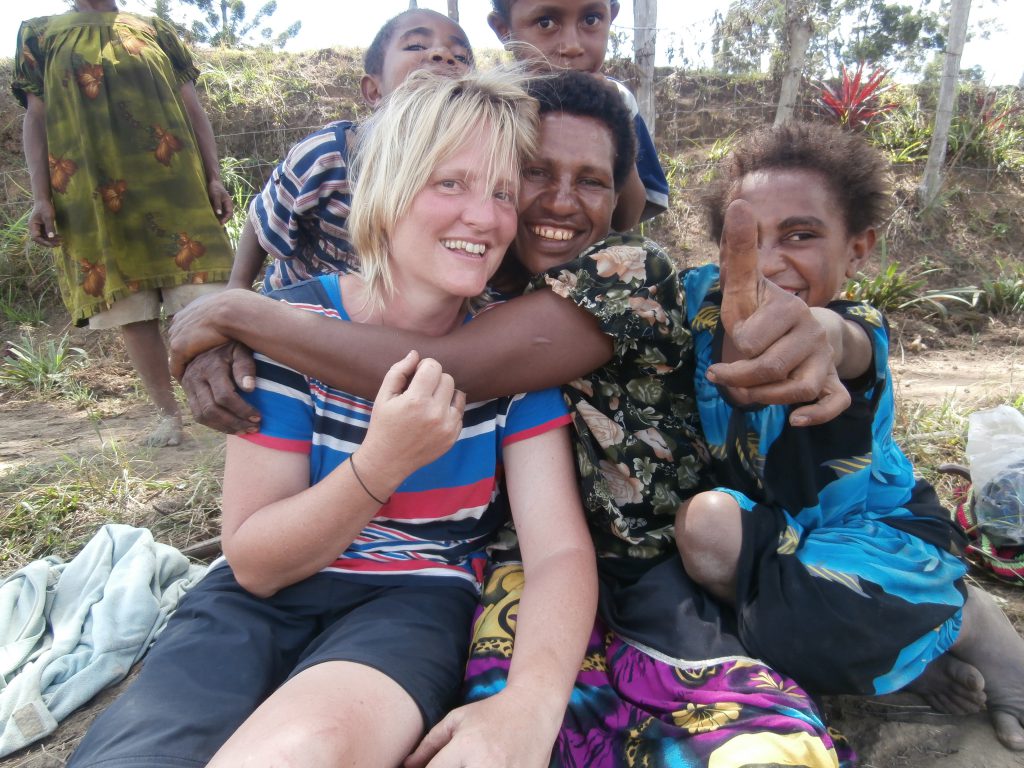
When I asked Regina if I could interview her, she seemed taken aback.
“Interview me?” she asked.
“Yes,” I affirmed, and we sat down for a quick chat. Although this was not nearly enough time to cover the expanse of her life and career, it was nonetheless enlightening. I know Regina Knapp as my Culture Change and Exchange Professor. Our class aims to understand how to write a good academic research paper. We were also able to learn about different aspects and forms of each other’s cultures as Regina encouraged us to speak of our cultures in relation to the topics we were studying. I remember initially being fascinated by her and her accent as she talked about her life in Papua New Guinea. Her accent is a product of the vast array of experiences she has had in her life: It is partly German through her upbringing and partly British, possibly from her travels to and from Papua New Guinea, with the occasional Australian slip. In class, she is very straightforward in her approach to anthropology: “It’s the study of humans, basically,” she says. It combines various aspects of human existence like development, language, and culture to try to understand humankind in their societies.
Regina has fond memories of the old mining town of Wau, Papua New Guinea where she was born to parents who worked there. “It was very cozy. I was always comfortable around the locals and never felt apprehensive. I also distinctly remember smells, which was exciting because, when I went back to Papua New Guinea, I recognized many of them!” Since then she’s had an extremely busy life. In 2001, she began her professional work as an anthropologist after receiving her Master’s Degree in Anthropology and Media Studies at the Freie Universität and her PhD at the Australian National University in 2011, the world’s best university for Pacific Studies. “At first, it was terrifying,” she recalls. “They [the Australian National University] were very strict and really beat me into shape.” She attributes her current professionalism to their firm and controlled approach to academics.
In 2012, Regina had the opportunity to go back to Papua New Guinea for research. She spent months floating back and forth between Germany and the city of Goroka. Listening to Regina talk about her projects was incredible. She devoted four months to exploring the role of gender, the role of ‘person,’ and the importance of women in the Highlands of Papua New Guinea in Goroka. She came across Cultural Change as an anthropological study during this process. It asks: How do we discover culture and, moreover, what are the forms and styles of exchange within and between them? For this project, Regina studied Bena Bena, one of Papua New Guinea’s 800 languages, in extensive detail. “Language is an integral part of exchange,” she explains. “It requires a very detailed study as it is so central to the concept of culture!”
Her projects involved severe commitment and dedication. She would spend 6 or 7 months at a time on one project. “Research takes time,” she chided when I expressed how appalled I am at the duration of the projects. In the course of her research, she has been fully adopted by one of the tribes in Papua New Guinea. Though this form of adoption does not adhere to any legal standard, it is socially legitimate. They fondly call her Gina. She often speaks of their culture with great respect and adoration and recalls that they never let her feel excluded from their activities. “They are fantastic people. Because I’m adopted, I have access to land, and they’re currently building a house for me on it. It’s by the river,” she says contently. “They were, are, and always will be my family.”.
When she isn’t focused on her projects, she is freelancing at the anthropological museum in Berlin — a job she’s had for twenty years! On asking her to talk more about this job, she simply sighs and laughs. She mumbles some sentences under her breath (and while I’m pretty sure they’re curse words, I don’t prod). “It is sad to see the Ethnological Museum in Berlin is not particularly open to innovative research, although they claim to be,” she says. “It’s incredibly tough to be an anthropologist, and more so if you don’t have the creative freedom to innovate and invent. Anthropology requires exploring and discovering!” Regina, whose form of anthropology is visual and requires copious amounts of attention to detail, requires such freedom.
As I’m wrapping up the interview, I’m amazed. This is a woman who has accomplished so much in her life and is so brilliantly dedicated to her anthropological work and yet has taken not one second to flaunt it. She tells her story with amazing grace and control. It’s inspiring.
As I make my last notes, she sighs. “Bard College Berlin is very different,” she announces suddenly. “I love the students and their enthusiasm. I’ve lectured at the Freie Universität and believe me when I say that the students at BCB are incredibly refreshing!” She jokes that there’s nothing better as an anthropologist than to be at a place with such cultural diversity: “I could probably study it!”
Regina Knapp is easily one of the most fascinating people you’ll ever meet. Don’t underestimate the kind voice and the unassuming face; she’s a force to be reckoned with! It was wonderful to be able to take a class with her; we were able to share things about our own cultures and learn new things about others. If you have as many questions about her life as I do, you can find her either at the Winterfeldtmarkt on Saturdays or perhaps at the Gemäldegalerie on a lazy Sunday afternoon!
